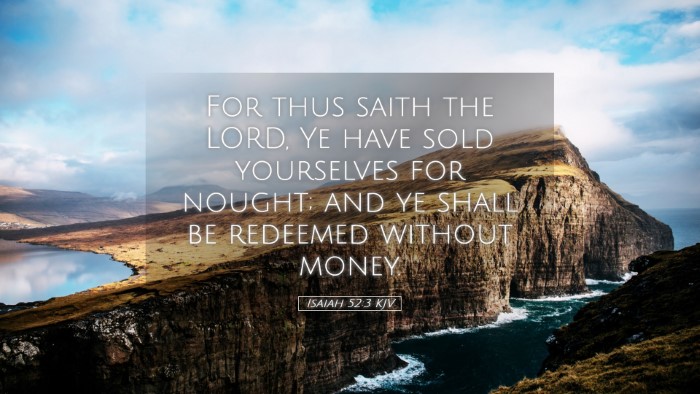Commentary on Isaiah 52:3
Isaiah 52:3 (ESV): "For thus says the Lord: You were sold for nothing, and you shall be redeemed without money."
Introduction
This verse serves as a pivotal declaration of hope and redemption, conveying profound theological implications regarding God's grace and the nature of salvation. The context of this passage pertains to the Israelites' condition of exile and the assurance of divine intervention. Through the lens of various public domain commentaries, we can glean deeper insights into the themes presented in this verse.
Context and Historical Background
Isaiah prophesied during a tumultuous time for the nation of Israel. The prophetic voice addresses a people deeply entrenched in sin and idolatry, yet longing for redemption. Commentators like Matthew Henry elucidate that this proclamation emphasizes the undeserved nature of God's grace inasmuch as the Israelites were previously "sold for nothing," depicting their lowly state following their rebellion.
Exile and Redemption
Albert Barnes comments on the dual notion of being "sold" and "redeemed." The Israelites' exile is likened to slavery, where they were given over due to their transgressions. This state of bondage underscores a stark contrast to the forthcoming promise of liberation, suggesting that their freedom will be enacted without payment—a significant theological assertion indicating that God's redemption cannot be bought or earned.
Theological Significance
This verse opens avenues for understanding God's redemptive work from a theological perspective. The phrase "without money" indicates that salvation is a gift rooted in grace, as emphasized by Adam Clarke. This challenges any notion of meritocracy within soteriology and highlights the holistic doctrine of grace across the biblical narrative.
The Nature of Divine Redemption
Henry speaks to the character of divine redemption, asserting that it is driven by God's love and mercy. Unlike human systems of exchange, God's offer of salvation is one-sided, reliant solely on His character and will. This is an important reminder to contemporary believers regarding the foundation of their faith; it is not a transaction but a relationship fostered by divine love.
Application for Believers
In practical terms, Isaiah 52:3 calls believers to a deeper understanding of their own state prior to accepting God's grace. The acknowledgment of having been "sold for nothing" can serve as a humbling reflection for individual believers, urging them to recognize their own nature and the transformative work of God in their lives.
Pursuit of Holiness
As believers revel in this truth of grace, the call to a holy living emerges. The context of redemption urges the faithful toward a life that reflects the righteousness received through Christ. Barnes encourages believers to respond actively to this incredible gift, moving beyond mere gratitude to embody the values of the Kingdom of God.
Conclusion
Thus, Isaiah 52:3 encapsulates not only the plight of Israel but also the grand narrative of redemption that stretches through the entirety of scripture. The insights drawn from Henry, Barnes, and Clarke highlight the multifaceted nature of this verse and its applicability to current theological discourse. As pastors, students, theologians, and scholars engage with this rich text, they are reminded of the profound implications of God's unmerited favor and the transformative power of His redemptive plan.
Final Thoughts
In sum, Isaiah 52:3 is a beacon of hope, extending an invitation to all who feel enslaved by sin or despair. It speaks volumes about the nature of God and His unwavering commitment to redeem those who cannot redeem themselves, marking a crucial point of reflection for all who seek to understand the depths of divine grace.


